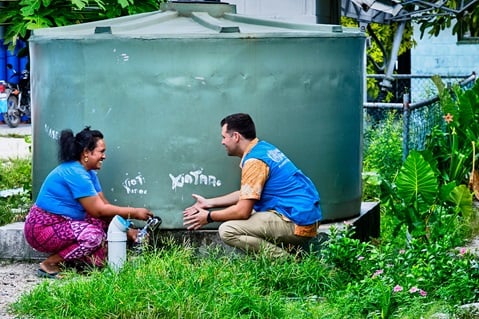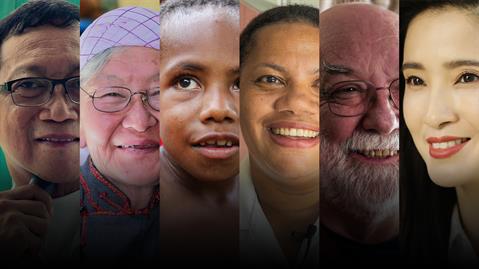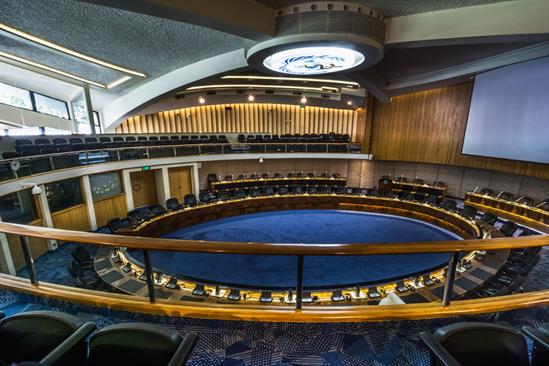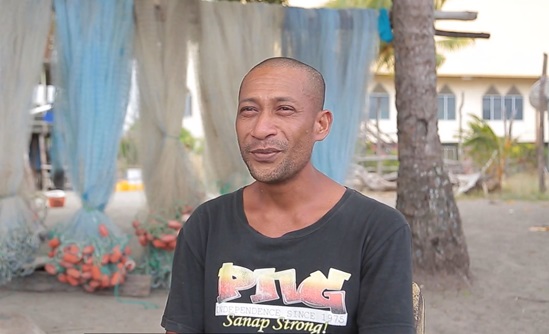Objective
The CCE TAG will operationalize and address the climate and environment threats to health in the Region through four areas of focus: (1) stronger advocacy for the CCE agenda; (2) strengthening implementation of CCE-resilient health-care facilities; (3) strengthening evidence on CCE including the health co-benefits of mitigation measures by other sectors; and (4) advocating the CCE agenda in all WHO programmes.
Functions
In its capacity as an advisory body to WHO Regional Office for the Western Pacific, the CCE TAG shall have the following functions:
- Identify good practices and innovative approaches in relation to CCE;
- Advise WHO in the Western Pacific Region (WPRO)on technical issues and make recommendations on:
a. advocating for the health co benefits of climate actions;
b. building climate-resilient and environmentally sustainable health systems;
c. monitoring and evaluating the impact of climate change and environmental hazards on health;
d. improving Water, Sanitation, Hygiene and Health care waste management (WASH) coverage in the Region, with a primary focus on healthcare facilities; - In the event of major emergencies and disasters or during extreme weather and climate events at national, regional or global levels, provide technical advice on response and recovery plans related to environmental public health as requested;
- Raise the profile of CCE at national, regional and global levels through advising WHO on strategic communication and advocacy;
Structure
The CCE TAG’s work is organized around four key pillars:
- advocacy to raise the profile of climate change, the environment and health and to articulate the health co-benefits of actions and policies from non-health sectors;
- building resilience into health systems to withstand the impacts of climate change and environmental threats;
- monitoring the impact of climate change and the environment on health to provide timely, accurate and strategic information to inform decision-making, guide advocacy, drive action, and track the impacts and successes of interventions; and
- applying a climate change and environment lens to all of WHO’s work in the Western Pacific Region.
Safeguarding WHO against conflicts of interests
CCE TAG members must respect the impartiality and independence required of WHO. In performing their work, members may not seek or accept instructions from any Government or from any authority external to the Organization. They must be free of any real, potential or apparent conflicts of interest.
To this end, the members have completed a declaration of interests form and their appointment has been subject to the evaluation of completed forms by the WHO Secretariat, determining that their participation would not give rise to a real, potential or apparent conflict of interest.
Apart from the requirement of all members having to complete the WHO declaration of interest form, CCE TAG members have an ongoing obligation to inform the WHO of any interests real or perceived that may give raise to a real, potential or apparent conflict of interest. WHO may, from time to time, request CCE TAG members to complete a new declaration of interest form. This may be before a CCE TAG meeting or any other CCE TAG-related activity or engagement, as decided by WHO. Where WHO has made such a request, the CCE TAG member’s participation in the CCE TAG activity or engagement is subject to a determination that their participation would not give rise to a real, potential or apparent conflict of interest.
Public notice and comment process
In order to enhance WHO’s management of conflicts of interest, as well as strengthen public trust and transparency in connection with WHO advisory groups involving the provision of strategic and technical advice, the names and brief biographies of the six new members appointed to the CCE TAG are disclosed for public notice and comment.
The comments received by WHO through the public notice and comment process are treated confidentially and their receipt will be acknowledged through a generic email notification to the sender. Comments and perceptions brought to the attention of WHO through this process are carefully reviewed. WHO reserves the right to discuss information received through this process with the relevant expert with no attribution to the provider of such information. Upon review and assessment of the information received through this process, WHO, in its sole discretion, may take appropriate management action in accordance with its policies.
If you have any comments please send them to wprohae@who.int with subject: “Public comments on new CCE TAG members.”
Linkages with other advisory groups
The CCE TAG also engages with other related advisory groups such as the Technical Advisory Group on Universal Health Coverage in the Western Pacific Region and the Technical Advisory Group on the Asia Pacific Strategy for Emerging Diseases and Public Health Emergencies (APSED III).
Composition
WHO Regional Office for the Western Pacific has a technical advisory for climate change the environment and health consisting of 17 members, who serve in their personal capacities to represent a range of technical knowledge, skills and experience relevant to climate change, the environment and health.
In the selection of CCE TAG members, consideration was given to attaining an adequate distribution of expertise, professional reputation, influence on global and regional climate change, environment and health agenda setting, geographical and inter-disciplinary distribution, gender balance and ability to serve as CCE Champions/drivers.
9 members have been reappointed from the first term, and 6 new Members have been appointed to serve for a period of four years (30 January 2024 – 29 January 2028).
Disclaimer
In order to enhance its management of Conflicts of Interest as well as strengthen public trust and transparency in connection with WHO meetings involving the provision of technical/normative advice, the names and brief biographies of individuals (“Published Information” ) being considered for participation in such meetings are disclosed for public notice and comment.
The Published Information is provided by the experts themselves and is the sole responsibility of the individuals concerned. WHO is not responsible for the accuracy, veracity and completeness of the Published Information provided. Furthermore, in no event will WHO be responsible or liable for damages in relation to the use of, and reliance upon, the Published Information.
The comments received by WHO through the public notice and comment process are treated confidentially and their receipt will be acknowledged through a generic email notification to the sender. Comments and perceptions brought to the knowledge of WHO through this process are an integral component of WHO’s conflict of interest assessment policy and are carefully reviewed. WHO reserves the right to discuss information received through this process with the relevant expert with no attribution to the provider of such information. Upon review and assessment of the information received through this process, WHO, in its sole discretion, may take appropriate management action in accordance with its policies.
The participation of an expert in a WHO meeting does not imply that they are endorsed or recommended by the World Health Organization nor does it create a binding relationship between the expert and WHO.
The list of participating experts, a summary of relevant interests disclosed by such experts, and any appropriate mitigation measures taken by WHO relating to the management of conflicts of interests, will be reported publicly in accordance with WHO practice.
Members
Existing members
Areas of Expertise: Planetary Health, Climate Change and Health
Areas of Expertise: Climate Change and Health
Areas of Expertise: Climate Change and Health, Epidemiology, Public Health
Areas of Expertise: Health Systems Strengthening, Preparedness and Health Security
Areas of Expertise: Health Policy in Developing Countries and the Pacific
Areas of Expertise: WASH and Health, Climate Change Resilience Building
Areas of Expertise: Environmental Epidemiology, Climate Change, Global Health
Areas of Expertise: Global and Small Island Developing Nations Campaigner on Climate Change
Areas of Expertise: Journalism, Health (risk) Communication
New additional Members (2024)
Areas of Expertise: Climate change and precision health, environmental disasters
Areas of Expertise: Media and Communications for Climate resilience and environmental sustainability
Areas of Expertise: Rainwater Harvesting and Management, Water Quality and Treatment, Particle Separation, Civil and Environmental Engineering
Areas of expertise: Environmental health, health protection, public health
Areas of Expertise: Environmental Health Systems and their Socio-environmental Determinants
Areas of Expertise: Occupational and Environmental Health
Multimedia





